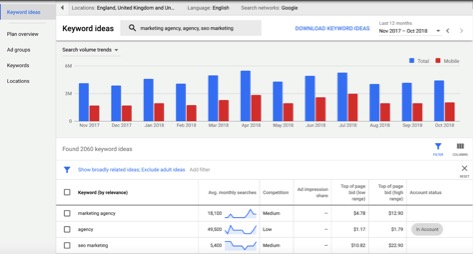It can be easy to get caught up in the latest SEO trends– mobile first, optimizing for featured snippets and using structured data. This article has some of the most important SEO basics that your business can apply to help your site rank higher in Google search results.
1.Research keywords for your SEO strategies
Make a listing of relevant topics based on your business
Consider the topics you need to rank for in phrases of ordinary buckets based on your business. Think about 5-10 subject matter buckets you have observed are critical in your business. Put yourself within the shoes of your customer personas and what types of subjects your target audience want to know in organic search. You might have trendy topics namely “inbound marketing”, “email advertising and marketing”, “lead generation”, “SEO”, “social media advertising and marketing” and “marketing automation”.
Fill in those topic buckets with keywords
Now it is time to identify some keywords that fall into the one’s buckets. These are keyword phrases you think are essential to rank for in the SERPs because your targeted customers are probably carrying out searches for the specific phrases.
Check for head terms and long-tail keywords
It is critical to check which you have a mix of head terms and long-tail keywords. Head terms are keywords phrases that are shorter and generic while long-tail keywords are longer keyword phrases usually containing three or more words. Your business has to come up with a SEO keyword strategy that is balanced with long-term goals and short-time period wins.
Check how your competitors rank for SEO keywords
Understanding what keywords your competitors are trying to rank for is a great way to help you give your list of keywords another evaluation. If your competitors are ranking for certain keywords that are on your listing, it clearly makes feel to work on enhancing your ranking for those keywords. Do include those SEO keywords your competitors don’t appear to care about with SEO analysis tools namely Ahrefs.

Then you can use the Google AdWords Keyword Planner to cut down your keyword list. It is time to narrow down your lists.

In Keyword Planner, you can get search volume and traffic estimates for SEO keywords you are considering. Google Trends allow you to determine which keywords and phrases are trending upward, and are thus worth more of your focus. Be sure to re-evaluate your SEO keywords regularly.
2. Create skyscraper content
Skyscraper content includes finding high performing content in your niche and developing something higher, and then promoting it. You have to create quality content and develop content marketing strategies to boost organic traffic and outpace your competitors. You can discover your competitor’s most popular contents with Ahrefs, SEMrush and Buzzsumo tools.
SEMrush’s Content Analyzer is a good option that includes a content audit feature, which tells you when content was most recently updated and the number of shares a given piece of content received across social media. SEMrush also let you spot your competitor’s top content and display the keywords and phrases they rank for.

At NDN Group, we are SEO strategic partner of travelwebsite.com, an up-and-coming travel company based in Hong Kong. With the informative nature of the webpage, the improvement of content would naturally become our top priority.
With regular reviews and analyses on the website’s SEO performance, our specialists provide suggestions on trending and seasonal content that motivates potential clients to read on and stay, which is considered as a positive user experience. Our digital team gives insights on figures and finds any obstacles to achieving an optimized user experience.
3. Take advantage of high-performing posts
You recognize that internal linking is a superb SEO practice. Most users don’t click past the first page. That means your pages with much less authority will be disregarded and could receive only lucky click. You can remedy this pretty fast. If you have got pages with high authority showing up at the first page of the search outcomes, take benefit of this and hyperlink to lower rating posts from these high-performing posts. This method can lead to extra clicks and higher rankings.
4. Optimize your landing pages
One key element Google uses to gauge the quality of a post is its bounce rate – how quickly people leave your website after clicking on it in the search results. If people search Google and click on your website, then discover it is not relevant to them and then leave. Google takes notice and if this happens more, Google will drop your ranking for that search term.
Every page on your internet site ought to have a goal based on where your targeted customers are on the customers’ journey. Trying to sell to someone searching for information will simply annoy them and cause them to bounce. That is why you need to understand your users where they are coming from and what are their needs at that stage.
5. Increase popularity by encouraging repeat visitors
Marketing is a long-term proposition aimed at pleasing customer need. Satisfying customer desire will inspire repeat visitors and repeat visitors will boost web traffic. By offering relevant, interactive content this is demanded via customers, your business website becomes more popular and ranking will grow over time. When using nontechnical techniques, sound marketing principles will ultimately lead to increased web rankings.
Conclusion
The SEO is tough and there are very few winners and a pile of losers. Your business needs to start making SEO a priority. Our SEO strategies will help your company boost website traffic and conversion rate, drive revenue and sales growth, thereby outpacing your competitors and upscaling business. Contact us at info@ndngroup.com.hk for a SEO consultation today.
